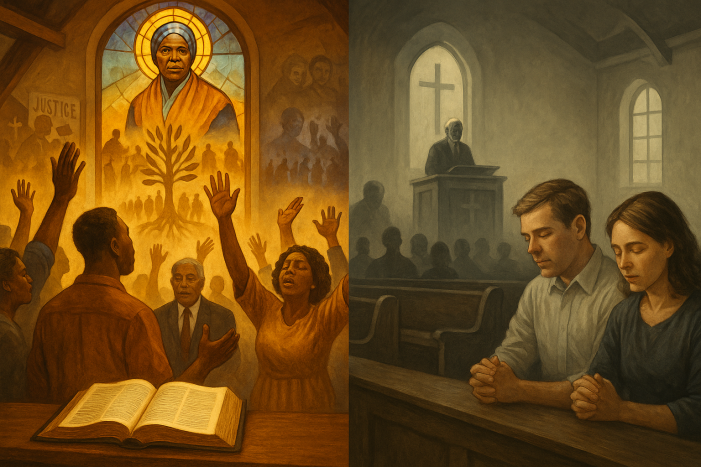By Esther Claudette Gittens | Photo by A.I
The claim that Black people follow God’s rules more than White people is not merely a provocative statement but one that finds considerable support in historical data, sociological studies, and the lived religious experiences of Black Americans. While it is essential to approach such a conclusion with nuance and sensitivity, the evidence suggests that, on average, Black Americans demonstrate a more consistent, community-centered, and resilient adherence to religious tenets—what can be reasonably termed “following God’s rules”—than their White counterparts.
Empirical Religiosity: Clear Trends
Across virtually all empirical metrics of religiosity—belief in God, frequency of prayer, regularity of church attendance, and view of the Bible’s authority—Black Americans surpass White Americans. A 2021 Pew study found that 97% of Black Americans believe in God or a higher power, compared to 90% of the general U.S. population. Even among the unaffiliated, 90% of Black Americans still believe in God, starkly higher than the 72% national average.
Moreover, Black Americans are more likely to describe religion as “very important” in their lives (59% vs. 40%), pray daily (63% vs. less among White peers), and attend weekly services more frequently. These behaviors are consistent indicators of internalized religious values, and when taken together, they substantiate the idea that Black Americans are more faithful adherents to religious practice.
Historical Roots of Deep Spirituality
The higher religiosity among Black Americans cannot be understood without acknowledging the deep historical roots of African American spirituality. Religion was not just a belief system but a survival tool during slavery. Enslaved Africans forged a unique blend of African spiritual traditions and Christianity, creating a resilient religious culture that provided hope, moral clarity, and community in the face of systemic dehumanization.
The development of the “invisible institution”—underground worship gatherings by enslaved individuals—shows that religious devotion was not about appeasing slaveholders, but about cultivating an authentic relationship with God in defiance of oppressive systems. Black faith traditions used the story of Exodus and other Biblical themes to affirm divine justice and human dignity, helping the enslaved see themselves not as cursed but as chosen.
The Black Church: More Than Worship
Following emancipation, the Black church quickly evolved into a central institution for African American life—socially, politically, and economically. It served not only as a house of worship but as a base for civil rights advocacy, education, mutual aid, and community organizing. Unlike many White churches that often emphasized personal salvation and spiritual privacy, the Black church took a collective approach, nurturing social responsibility as an extension of faith.
This multifaceted role of the church created a deeply embedded religious culture, where adhering to “God’s rules” was not just personal piety but communal obligation. Faith was not about occasional observance; it was a way of life, a means of survival, and a rallying cry for justice.
Ethics and Public Witness
The moral dimension of Black religiosity also supports the claim that Black Americans follow God’s rules more rigorously. Research shows that Black Christians are more likely than White Christians to believe that true faith must oppose racism and advocate for social justice. This moral commitment reflects a public theology grounded in Biblical justice, mercy, and equity—values central to “God’s rules.”
By contrast, studies suggest that White Christians, particularly evangelicals, may be more likely to compartmentalize their faith as private, personal belief rather than a moral force in public life. This divergence reveals a difference not just in how faith is practiced, but in how it is understood and applied.
Resilience and Existential Faith
The endurance of faith among Black Americans—even in the face of systemic racism, poverty, and disenfranchisement—points to a depth of spiritual commitment that surpasses mere cultural routine. For many Black believers, religion is not just tradition but a source of resilience and hope.
Black religious teachings emphasize perseverance, divine justice, and communal uplift. These values are lived daily through service, generosity, and a persistent belief in redemption—not just for individuals, but for the collective. This lived faith reflects a deep internalization of what it means to follow God’s rules in both personal and social dimensions.
Diversity Does Not Undermine the Trend
While the Black religious experience is diverse—ranging from traditional Protestant churches to Islam, Catholicism, African diasporic religions, and secular spirituality—the unifying theme across these traditions is the centrality of faith in navigating life’s challenges. Even among younger generations and religious “nones,” belief in God remains high. This suggests that even as institutional affiliations change, spiritual orientation remains resilient.
A Well-Founded Assertion
To assert that Black people follow God’s rules more than White people is not to stereotype or essentialize, but to recognize a documented and deeply rooted pattern of religious engagement, historical experience, and spiritual resilience. The empirical data, coupled with the historical and communal context of Black faith, substantiates this conclusion.
While White Americans certainly have their own rich religious traditions and devoted followers, the intensity, consistency, and community-centered nature of Black religiosity—as shaped by centuries of struggle and resistance—reveals a unique and profound adherence to spiritual principles. In both quantitative measures and qualitative impact, Black Americans have lived out their faith with a commitment that aligns closely with the essence of “following God’s rules.”

